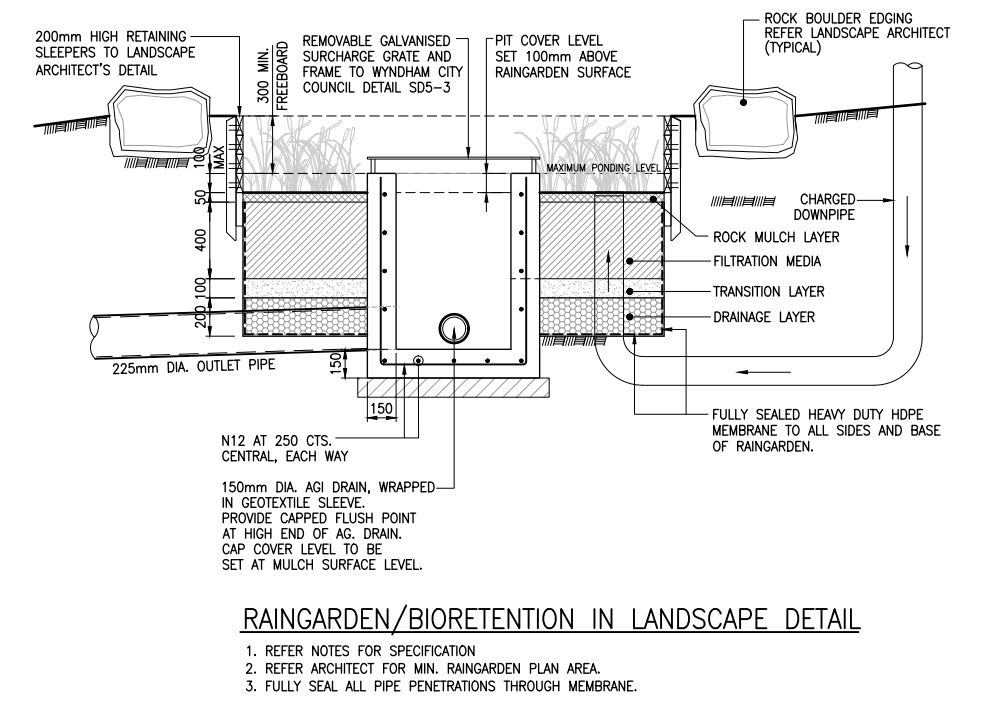BESS for ESD report
In the planning permit stage, governing councils in Victoria require applicants to provide evidence of how their designs are environmentally sustainable and meet the council targets/benchmarks. Depending on the scale of the project, evidence of sustainable design must be provided in the framework of ESD management plans (SDA report for small-scale and SMP report for large-scale buildings). Built Environment Sustainability Scorecard (BESS) is a scorecard to assess and prove that a building complies with Environmentally Sustainable Design (ESD) requirements of a local council.
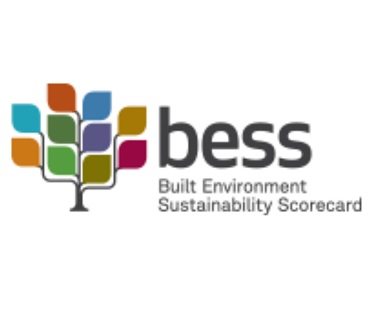
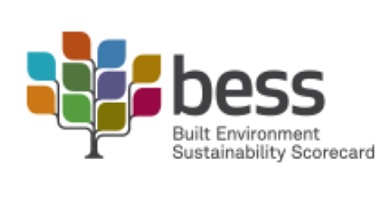
BESS tool for ESD reports
In the planning permit stage, governing councils in Victoria require applicants to provide evidence of how their designs are environmentally sustainable and meet the council targets/benchmarks. Depending on the scale of the project, evidence of sustainable design must be provided in the framework of ESD management plans (SDA report for small-scale and SMP for large-scale buildings). Built Environment Sustainability Scorecard (BESS) is a scorecard to assess and prove that a building complies with Environmentally Sustainable Design (ESD) requirements of a local council.
The benefits of BESS
- BESS is a free online tool to use and practice.
- It covers almost all Building Classes.
- It covers nine categories in a sustainable building design:
How BESS scoring system works?
BESS scoring simply depends on the degree of sustainable elements and efforts in each of the nine sustainability categories. Each category has its own weight and depending on the degree of sustainability and weighting of each category, the final score is generated within BESS online tool. Category weighting in the current version of BESS are:

IEQ

Energy

Water
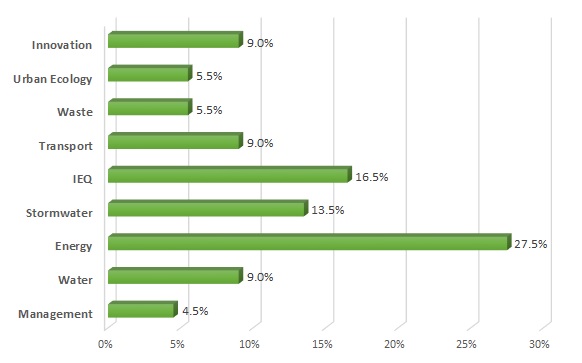

Stormwater

Transport

Waste
BESS is a tool that was created by the Victorian Council Alliance for a Sustainable Built Environment. This tool is an integrated form of old STEPS and SDS tools that were used for residential and non-residential developments and is equivalent to BASIX in New South Wales.

Innovation

Ecology

Management
following categories require mandatory pass scores:
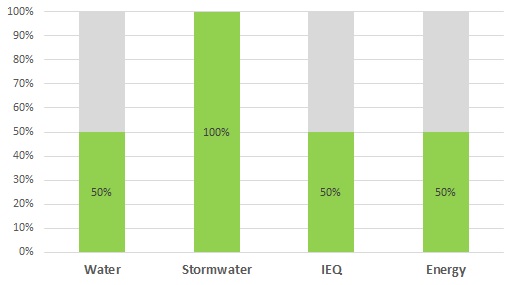
BESS final overall score as an acceptable outlet would be:
- Best practice: where proposed building achieves 50% or higher.
- Excellence: where the proposed building achieves 70% or higher.
- It is simple and very easy to use.
- BESS reports are accredited by all Victorian councils as it is a tool solely used for SDA and SMP assessments.
- Other than its in-built calculator, it allows for an external report using modelling software results (i.e. for daylighting or energy use).
- It is user-friendly with an internal straightforward guide to use.
- It can be used as a learning tool for those who seek to study more about sustainable building design.
In summary, the BESS report demonstrates how the proposed building performs in each sustainability categories relative to the total points available. This report also determines which elements of the report must be reflected in the architectural plans and which document must be uploaded/delivered to BESS as evidence of sustainable design.
The benefits of BESS
- BESS is a free online tool to use and practice.
- It covers almost all Building Classes.
- It covers nine categories in a sustainable building design
- It is simple and very easy to use.
- BESS reports are accredited by all Victorian councils as it is a tool solely used for SDA and SMP assessments.
- Other than its in-built calculator, it allows for an external report using modelling software results (i.e. for daylighting or energy use).
- It is user-friendly with an internal straightforward guide to use.
- It can be used as a learning tool for those who seek to study more about sustainable building design
How scoring system works?
BESS scoring simply depends on the degree of sustainable elements and efforts in each of the nine sustainability categories. Each category has its own weight and depending on the degree of sustainability and weighting of each category, the final score is generated within BESS online tool. Category weighting in the current version of BESS are:

BESS is a tool that was created by the Victorian Council Alliance for a Sustainable Built Environment. This tool is an integrated form of old STEPS and SDS tools that were used for residential and non-residential developments and is equivalent to BASIX in New South Wales.
following categories require mandatory pass scores:

BESS final overall score as an acceptable outlet would be:
- Best practice: where proposed building achieves 50% or higher.
- Excellence: where the proposed building achieves 70% or higher.
In summary, the BESS report demonstrates how the proposed building performs in each sustainability categories relative to the total points available. This report also determines which elements of the report must be reflected in the architectural plans and which document must be uploaded/delivered to BESS as evidence of sustainable design.
Which Victorian councils require BESS assessment?
As of 2021, 26 out of 79 Victorian councils (33%) require some mandatory assessments and also encourage voluntary efforts to address elements of sustainability in the planning permit process. Among Victorian councils that require these assessments are:
- Banyule City Council
- City of Bayside
- Brimbank City Council
- Darebin City Council
- City of Greater Geelong
- Glen Eira City Council
- City of Greater Dandenong
- Hobsons Bay City Council
- Hume City Council
- City of Kingston
- Knox City Council
- Manningham City Council
- Maribyrnong City Council
- Maroondah City Council
- City of Melbourne
- City of Monash
- Moonee Valley City Council
- Moreland City Council
- City of Greater Bendigo
- City of Port Phillip
- City of Stonnington
- City of Whitehorse
- City of Whittlesea
- Wyndham City
- City of Yarra
- Yarra Ranges Shire Council
Which Victorian councils require BESS report?
As of 2021, 26 out of 79 Victorian councils (33%) require some mandatory assessments and also encourage voluntary efforts to address elements of sustainability in the planning permit process. Among Victorian councils that require these assessments are:
- Banyule City Council
- City of Bayside
- Brimbank City Council
- Darebin City Council
- City of Greater Geelong
- Glen Eira City Council
- City of Greater Dandenong
- Hobsons Bay City Council
- Hume City Council
- City of Kingston
- Knox City Council
- Manningham City Council
- Maribyrnong City Council
- Maroondah City Council
- City of Melbourne
- City of Monash
- Moonee Valley City Council
- Moreland City Council
- City of Greater Bendigo
- City of Port Phillip
- City of Stonnington
- City of Whitehorse
- City of Whittlesea
- Wyndham City
- City of Yarra
- Yarra Ranges Shire Council
How do we deliver the BESS report at Energy Compliance Consultants?
At Energy Compliance Consultants, we encourage developers, builders and architects to consult us for sustainability solutions at the design stage as it is much easier to implement low-cost solutions. For early consultation and assessment, concept plans are sufficient. To finalize the report, we will demand the following:
- Architectural drawings (including elevations, sections, window and material schedules),
- Energy compliance approach (For residential: DtS, NatHERS star rating, VURB & for commercial: DtS, JV3 modelling, Green Star or NABERS). We will discuss and recommend you the most cost-effective approach to our clients based on our past experience,
- Plans to install on-site renewable energy generation systems,
- Water efficiency rating of domestic water fittings and fixtures,
- Preferences on Heating, Ventilation and Air Conditioning (HVAC) & Domestic hot water supply solutions.
After we gather the above, our engineers and energy assessors will prepare the complying report (SDA/SMP report) under council-approved templates considering to:
- Reduce total energy consumption while considering low-cost insulation and glazing,
- Best solution for daylight access through daylight modelling.
- Achieve best STORM ratings,
- Offer different proposals for all other sustainability categories (e.g. waste management and transport),
- Offer innovative energy solutions such as a low-cost passive house or innovations through CFD modelling,
- Assess the feasibility of most cost-effective renewable energy options (if required)

How much does a SDA, SMP or BESS report cost?
The cost of a typical BESS assessment and a report preparation depends on the building area, the complexity of the building, options for feasibility assessment, option for energy efficiency compliance. Obviously, the final cost of a BESS report can be set after concept architectural drawings are provided to assess how complex is the building. Feel free to call us to discuss the BESS compliance report for your building development.
Storm water treatment options
The following shows the details of a Rain garden or bio retention storm water treatment.
Sample Raingarden or bioretention
Details of a rain garden or bioretentaion storm water treatments for BESS SDA SMP
